Tag Archive for 'fisheries'
We are often asked what people can do to tackle overfishing and create more protected areas for the oceans’ wildlife. Well, the 70 environmental organisations that make up the Oceans 2012 campaign www.ocean2012.eu/petition have decided to make next week, starting June 6, European Fish Week and to petition the Commissioner for Maritime Affairs and Fisheries, Maria Damanaki, to make environmental sustainability a prerequisite for a reformed Common Fisheries Policy when it comes into force in 2012.
The link to the petition is here www.ocean2012.eu/petition. Make your voice heard!
Charles Clover

It was an ambush. Fishing nations, led by Libya, ruthlessly voted down proposals to ban international trade in Atlantic bluefin tuna at the meeting of 115 parties to the Convention on International Trade on Endangered Species this afternoon.
Delegates from Monaco, the EU and the United States had hoped to keep the proposals being discussed into next week in the hope that compromises could be found. In the event, the debate was short and not at all sweet. Monaco’s proposal for an unqualified trade ban was rejected by 68 votes to 20, with 30 abstentions. Before that, the EU’s highly qualified version of the same proposal was crushed by 72 votes to 43.
The debate began with Monaco’s ambassador, Patrick Van Klaveren, speaking out in favour the proposal to place the Atlantic bluefin on Cites Appendix 1, on the grounds that the tuna had declined to less than 15 per cent of its original stock and UN scientists from two official bodies accepted that the criteria for it to be listed on Appendix 1 had been met.
This was followed by a lacklustre presentation, by the Spanish presidency, in favour of the conditions the EU wanted to place on the proposal. Then, instead of the torrent of support conservationists had hoped for there was a cascade of fishing nations, starting with Canada, speaking out against the proposed ban and in favour of leaving the management of the bluefin with the Atlantic tuna commission, ICCAT, which until recently has failed to set scientifically based quotas or to crack down on illegal fishing.
Speeches in favour of ICCAT continuing to manage the species, which can fetch up to $100,000 for a single specimen on the Japanese market, rolled on – Indonesia, Tunisia, United Arab Emirates, Venezuela, Chile, Japan, Grenada, Korea, Senegal, Morocco.
Tunisia talked of social problems that would be caused if there was a ban, Morocco spoke of 2000 families in an area of no other employment who would have no income. Morocco said the bluefin was a flagship species it was in the interests of all to preserve, but said it was premature to regulate it under Cites.
Only Kenya, Norway and the United States spoke up in favour of a ban, despite advice from both the UN Food and Agriculture Organisation and ICCAT’s own scientific committee that the bluefin deserved a respite from international trade.
By the time the eccentric Libyan delegate got the floor, it was clear where the majority lay. All it took was for Libya to propose a vote on Monaco’s proposal, and the chairman of the meeting, John Donaldson, had to put the proposal to close the debate to the meeting.
It was quite clear from there what would happen. Once the vote to hold a vote had been passed, the votes on the EU’s and Monaco’s vote were both lost.
Patrick Van Klaveren, for Monaco, said magnanimously: “It is not a defeat it is the manifestation of confidence put in ICCAT to solve the problem.” He threatened to come back in 2013 with another proposal to list the bluefin under Appendix 1 if ICCAT failed to take up the challenge to manage the bluefin for recovery.
At the press conference he shook hands with the leader of the Japanese delegation, Mitsunori Miyahara, who had taken part in the defeat of an attempt to place the bluefin on Cites in 1992.
Mr Miyahara, chief counsellor to the Japanese Fisheries Agency, said: “We agree that the bluefin is not in good shape. We have to take any measure for recovery. We have to work harder from now on.”
He said that at last November’s meeting of ICCAT, “finally the system started to work.”
“We are going to wipe out illegal fish from our markets.”
Sue Lieberman of the Pew Environment Trust branded the decision “irresponsible.”
“This meeting has said let’s take science and throw it out the door. There was clearly pressure from fishing industry. This fish is too valuable for its own good.
“Statements made about ICCAT blatantly were false. It’s time to hold ICCAT’s feet to the fire. We will be there every step of the way.”
Charles Clover

Copenhagen
As I dashed through the snow from the chaos around the COP15 climate conference to a screening of The End of the Line near the Town Hall in this lovely city, the phone went and I learned that European Ministers have done the right thing, arguably for the first time, in the annual talks over fish quotas, a story that might make headlines if it was not overshadowed by the climate talks.
They approved quotas based on scientific advice on North Sea cod, plaice and sole without discussion - instead of setting them at significantly more than scientists recommended as so often in recent years.
They also decided to ban fishing for the critically endangered porbeagle shark and cut allowable catches for the equally endangered spurdog.
What has come over them? Well partly it may have to do with an unprecedented spat with Norway over quotas, which will mean that these cannot be finalised until the New Year.
But I am also told that advisers have woken up to the fact that none of the major processers and retailers such as Birds Eye and Youngs are buying the North Sea cod because it is not being harvested sustainably.
Progressive ministers in Denmark, Germany and the UK have realised that the industry faces an uncertain future, and lower prices, unless it can sell its product across the whole market and this is behind the decision to bite the bullet, follow the scientific advice and manage the fishery properly. This is not before time, but to be applauded.
Could this have had anything to do with the fact that The End of the Line has been screened recently in all those countries?
Well, probably not directly, but indirectly the message that we in Europe can’t go on managing our seas like this seems to be getting through.

Let’s be absolutely clear. The people whose task it is to manage the bluefin tuna stocks of the Atlantic have failed once again, even under the eyes of the world, to take the advice of their own scientists. They should now be brushed aside.
The Atlantic tuna commission, meeting in Porto de Galinhas, Brazil, has agreed a proposal to drop the catch limit for bluefin tuna in the Eastern Atlantic and the Mediterranean next year from 19,500 tons to 13,500 tons.
I was at the meeting and interviewed the chief scientist of the commission, Dr Gerald P Scott and he told me that in the present uncertain state of bluefin stocks – which in layman’s terms are in a state of collapse - 15,000 tons doesn’t meet the commission’s recovery plan which looks for a 50 per cent chance of recovery by 2023.
The paper Dr Scott showed to the meeting showed that only a 8500 ton quota might have a chance of meeting the commission’s remarkably weak objective for recovery. Only a total closure of the fishery yielded a significant chance of the bluefin recovering from a serious threat of commercial extinction.
So the proposal for a 13,500 ton quota by the chairman of the meeting, supported by the EU, Japan, Morocco and Tunisia, is a political quota, not a scientific one. It is far too high. No wonder the United States did not support it. No wonder the environmentalists are portraying it as a failure. The only silver lining is that this decision could, just conceivably, lead to the management of the bluefin being taken away from the tuna commission.
Susan Lieberman of the Pew Environment Group, a US-based not-for-profit organisation, responded to the news by saying: “When you adjust the new catch limit to account for over-fishing and rampant illegal fishing by some countries and add in ICCAT’s poor enforcement and compliance record, the prospects for the recovery of the once-abundant Atlantic bluefin are dismal.”
No one is that surprised, though. For it has turned out that the International Commission for the Conservation of Atlantic Tunas (ICCAT) was mis-named, for it has never once taken scientific advice literally in its 40-year history as you will see from my article in the Sunday Times.
The result of the meeting is now likely to increase demands for international trade in bluefin to be banned by being listed on Appendix 1 of the Convention on International Trade in Endangered Species (CITES), the same provision that was used to save the African elephant in the 1980s after an epidemic of ivory poaching.
The EU was unable to agree to support such a listing in September, with the six Mediterranean nations forming a blocking minority and 21 nations in favour. That decision is likely to have to be formally revisited now before the CITES meeting in Doha next March.
The ICCAT meeting formally identified nearly all the countries catching bluefin for breaking the rules – a new thing – one of the most common infringements was tuna fattening farms accepting fish without proper documentation to show that they had been legally caught.
Despite a week spent at the five-star resort, delegates were unable to agree on measures to protect vulnerable shark species. They did agree to ban the retention and landing of bigeye threshers, one of the slowest growing and most vulnerable sharks, but allowed Mexico an exemption to catch 110 of them. They put off until next year any consideration of measures to prevent 12,500 vulnerable seabirds being caught by tuna long-line fleets.
In a further instance of what environmentalists were portraying as overall failure, officials among the Atlantic nations endorsed the use of “wall of death” drift nets by Morocco for another two years.
Moroccan fishermen are estimated to kill 4,000 dolphins and 25,000 sharks in their drift nets each year. Drift nets have been banned internationally by the UN since 1992.
Dr Sergi Tudela of the environmental group, WWF, said: “This year all contracting parties talked of the need to restore ICCAT’s credibility, and to do so they endorse the slaughter of 50,000 more sharks and 8,000 more dolphins, violating UN resolutions?
“It is beyond belief and is one more proof of the total dysfunction of ICCAT as a serious fisheries management organisation.”
No comment was available from the ICCAT contracting parties or the European Commission last night on the decisions made at the meeting.

The End of the Line was shown in remarkable circumstances this week – in the official convention hall of a hotel near Recife, Brazil, where the world’s oldest whole-ocean fisheries management organisation was meeting to set controversial catch limits for the Atlantic’s dwindling populations of tuna, swordfish and sharks.
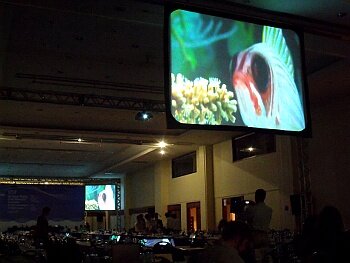
The End of the Line is shown at the International Commission for the Conservation of Atlantic Tunas meeting in Brazil
It took a certain amount of persuasion. It needed the crucial backing of the Brazilian chairman of the meeting, Prof Fabio Hazin (the curiosity of these meetings is that the chairmen are usually enlightened while the contracting parties from the fishing nations, which include Libya, are anything but).
It also needed a mysterious process of agreement from heads of delegations sitting in closed session.
The chief scientist, Dr Gerald P Scott, an American, was consulted, and pronounced in a neutral kind of way that the idea of showing a film, after and outside the official business of the day, was something that had been done before - though quite when nobody could remember - and might provide an opportunity some delegates might not otherwise get to see it. The film was duly shown in the convention centre, on official equipment.
Was this a sign that the dysfunctional International Commission for the Conservation of Atlantic Tunas – often known to its critics as the International Conspiracy for Catching All The Tuna – was at last beginning to listen to voices outside the fishing industry, such as the citizens who actually pay them to manage the sea? No one could say for sure.
About 40 people postponed their need for a beer or managed to slip out of meetings to see the film. Some of these, inevitably, were the already converted: conservationists who were seeing the film as an act of solidarity with its message.
Two Asian delegations stood around talking before filing out. But here and there, as you looked around, were some senior delegation folk sitting in small groups including, significantly, most of the Spanish delegation. At the end, there was applause.
We were approached the next night by the secretariat requesting a second screening for delegations, principally Mexico, that had missed the screening we had organised because of meetings. So we were back by popular demand.
Could the message be getting out that our seas are a mess and ICCAT has failed for 40 years to tackle the problem of the depleting Atlantic ocean?
Whether or not this was a sign of changing times, for once this week the message got through.
Ends

- This article originally appeared on Crikey.com.au
A last-ditch campaign to save the bluefin tuna is fast gathering support in Britain and will soon become a political and environmental issue in Australia where the species is being fished with indiscriminate abandon for super profits.
London’s celebrity chefs are taking the endangered fish off their menus and Waitrose supermarket has banned its sale. Fishmongers and restaurateurs throughout the country are being assailed - or so we read - by customers asking, “Do you source your fish sustainably?”
Bluefin tuna is on the brink of extinction through overfishing, and the issue is now so critical that both Britain and France are supporting a resolution by Monaco to ban fishing of the species when the Convention on International Trade in Endangered Species (Cites) meets in Doha in October.
Japan, where a single fish can command more than $120,000, is expected to oppose the move. Let’s see what that gallant protector of the whale, Peter Garrett, decides to do.
The issue of overfishing has come to the fore in the past month thanks to the release of the critically acclaimed documentary The End of the Line, based on the award-winning book by London Daily Telegraph journalist Charles Clover. “Everybody knows there’s no fish left in the sea,” says Clover. “They probably caught them while we were filming it.”
Mature spawners are fished out in UK waters, and are fast disappearing in the Mediterranean, where bluefin are still being landed at a rate of at least 60,000 tonnes a year - three times the legal limit, with organised crime with Mafia links said to be involved.
Public concern has led to a significant shift in policy in Britain and France. Although France has Europe’s biggest bluefin fishing fleet, President Nicholas Sarkozy last month spoke out for the need to protect fishing stocks. “Ours is the last generation with the ability to take action before it’s too late,” he said.
British fisheries minister Huw Irranca-Davies followed suit, saying he will lobby the United States and other countries to support the ban on sales of bluefin.
The End of the Line, which premiered to critical acclaim at this year’s Sundance Film Festival, documents not only the bluefin issue but such cases of overfishing as the catastrophe of Newfoundland, home to the world’s most abundant supply of cod, which has been decimated since the early 1990s.
The film also shows how African coastal people, long dependent on fish, are losing their food supply to big commercial fisheries. And it demonstrates that fish farming, with its need for massive supplies of fish food, is no solution to the problem.
Scientists interviewed in the documentary predict that if fishing continues unchecked, the population of the oceans will be wiped out by 2048.
The End of the Line is an independent film made with the support of organisations including WWF, the Marine Conservation Society, Channel 4’s Britdoc Foundation and charitable foundations, and backed nationally by Waitrose.
It initiated a citizens’ campaign to change fish sales practices through consumer action. Jamie Oliver didn’t take tuna off his menus until clients started raising the issue. Japanese chain Nobu attracted spirited protests when it refused to stop serving tuna sushi in its London outlets.
The film-makers themselves are leading the campaign. Producer Claire Lewis, who says working on the project changed her life, doesn’t eat anywhere without first asking: “Can you tell me where your fish comes from?”
Author Charles Clover has been campaigning on the issue for five years now. “We must stop thinking of our oceans as a food factory,” he says, “and realise that they thrive as a huge and complex marine environment.
“We must act now to protect the sea from rampant overfishing so that there will be fish in the sea for our grandchildren and great-grandchildren.”
This documentary, which has the hard-hitting quality of Michael Moore’s movies, deserves to be released in Australia but no distributor has yet stepped forward.

So. Is the glass half full, or half empty?
There are of course other options, and it may well be difficult to tell because you are looking at the glass from a funny angle.
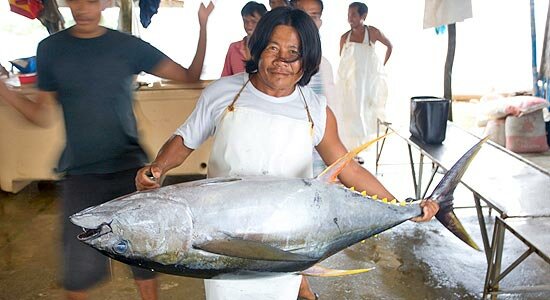
The new report underlines that in large swathes of the worlds' fisheries conservation measures are not happening
That certainly seems to be the conclusion when reading the various media interpretations of an important new study published in the journal Science on the world’s fisheries.
The study’s key co-authors are Professor Boris Worm, and Professor Ray Hilborn – who can be seen verbally dueling over the state of the world’s fisheries in The End Of The Line.
Continue reading ‘Good news for fisheries - if we continue conservation measures’

This may be a record. Our independent documentary film has run for four weeks in the West End of London, with four screenings a day, and continues to be picked up by London cinemas, including many which originally turned it down.

The End of the Line at the Screen on the Green, Islington, London
It is booked in cinemas around the country until the end of September.
As a writer and not a habitual film-maker, I had no idea how impressive that was, but Christopher Hird, our executive producer, tells me that nobody can remember another UK produced documentary having anything like this success.
Only An Inconvenient Truth had anything like this impact, and it had tens of millions of marketing money behind it that we have not.
What has astonished even us is the way the film has broken out of the usual circle of dedicated followers of the environmental cause and found its way into the consciousness of the public at large.
It has been taken up by the Sun, Hello and Heat magazine, as well as regional and local papers and the entire national press. Continue reading ‘An astonishing month for The End of the Line’

No, this is not another story about the crazy things we feed to our farm animals, but rather yet another sad tale of failure in fisheries management … and yet another nail in the coffin for bluefin tuna in the Mediterranean.
Quite apart from the fact that ICCAT (the body responsible for managing fish like bluefin tuna) has been repeatedly denounced as not fit for the job (specifically it was called an ‘international disgrace’ last year); and aside from the politicians having yet again set quotas for bluefin tuna in excess of the scientists recommendations; skipping over the issue of rampant illegal fishing for this species; and parking the small issue of this being an endangered species… Turkey has just unilaterally set itself a quota for bluefin, breaking international commitments and sticking two fingers up at any coordinated attempt to manage the species across national boundaries.
This is on top of a Greenpeace investigation revealing that between 5 and 10 tonnes of juvenile bluefin tuna had been landed in a Turkish port.
Now, as we know, fish (and other animals) don’t respect national boundaries, so in theory some international cooperation is a good idea when it comes to looking after these animals. Right? You’d think. But in true tragedy-of-the-commons style, that is often scant comfort for things that live in the ocean. Fish are horse-traded against other political issues, and compliance and enforcement is, well, variable to say the least.
But think for a moment, to what might happen if bluefin tuna were not a fish, but a land animal, like the similarly endangered rhino, tiger, or gorilla … would this be allowed to happen?
Maybe bluefin are just not cuddly enough, and a little too tasty – but they are amazing animals. This is one of the reasons why bluefin are the tragic stars of the new movie, The End Of The Line. If they were mammals they might be admired for their size (like elephants), speed (like cheetahs) or their place as a top predator (like tigers).
Sadly – they are more likely to be appraised only for the amount of dollars or yen they fetch at market. Of course this is scandalously short-sighted, and our collective greed and disregard is pushing the species towards extinction.
The people in charge of ‘managing’ bluefin tuna have failed – it’s time for a new approach, and for the species to be treated as it would be if it were an endangered animal on land. And with politicians and fishermen unwilling to do the right thing, it’s time for consumers and suppliers to take a stance.
So it’s up to the big players like Nobu, who serve up bluefin as sushi to celebrity diners, and Mitsubishi, who are the biggest traders in bluefin in the Mediterranean.
Not only should we all be avoiding bluefin on our menus, but also demanding our politicians take action to turn things around, and hopefully rescue the species from the abyss. The first step in the Mediterranean would be a ban on fishing all bluefin until such time as the management and enforcement was sorted out, and in setting aside areas where we know bluefin breed as protected Marine Reserves.
Otherwise, it might well be the end of the line for an iconic ocean species.

A row over scallop-dredging in Cardigan Bay has escalated after fisheries regulators ignored a demand by the Welsh Assembly’s wildlife advisers for an immediate and total ban in areas protected by European conservation legislation.
The call by the Countryside Council for Wales (CCW) for all scallop-dredging authorisations to be suspended pending completion of investigations into threats to wildlife followed a formal complaint to Brussels by four conservation groups, who accused the UK and Welsh governments and fisheries regulators of defying EU law by failing to stop scalloping-boats disturbing dolphins and seals and damaging or destroying their habitats and breeding sites.
The CCW is now effectively backing that line, saying that current dredging is breaking European wildlife-protection legislation.
CCW regional manager Tim Jones told the Lancaster-based North Western and North Wales Sea Fisheries Committee, which has responsibility for policing sea areas up to six miles from land, that the risk of damage to dolphins’ and seals’ habitats “may be imminent”, and that there was an “urgent” need for the committee to act.
The warning came just a month before the current scallop-dredging season in Cardigan Bay, which began in October, ends on 31 May.
But, in a response which is likely to exasperate the CCW, Stephen Atkins, the committee’s chief executive, made clear this week he was not prepared to intervene immediately to stop the dredging, which churns up the seabed and is widely recognised to be a very destructive method of gathering a highly valuable catch now classed as a luxury food.
He said: “Dredges do damage lots of types of seabed, but I am not prepared to pre-empt any decision by the committee, which does not meet next until 12 June.
“Officers do have delegated powers to take emergency action, but they are not terrifically explicit, and I would rather have committee support.”
Under a legally-backed precautionary regime within the EU Habitats Directive supposed to safeguard Cardigan Bay’s two special areas of conservation (SACs), authorities are obliged to act if there is even a well-founded suspicion that activities such as scallop-dredging could damage SACs.
But Dr Atkins said: “The trouble is the precautionary principle is a vague term, and we don’t really know how we define it.”
Some parts of the Bay’s northern and southern SACs have been closed to scalloping. But the concerns of CCW and conservation organisations including Friends of Cardigan Bay and the Whale and Dolphin Conservation Society
centre on about 45 square miles of theoretically protected waters off an area stretching from New Quay to Cemmaes Head known to be heavily used by bottlenose dolphins.
The tone of the letter from the CCW, which in the past has been criticised for being weak on marine protection, is uncharacteristically hard-hitting, accusing the fisheries committee of “deficiencies” in its approach “to the assessment of the potential impacts on the fishery.”
It says an assessment of environmental impacts underpinning current scallop-dredging authorisations contains weaknesses and is four years out of date, and that it is concerned that dredging currently allowed in Cardigan Bay and Pen Llyn a’r Sarnau SACs is illegal under the terms of the Habitats Directive.
The CCW has sent a similar letter to the Assembly government, which is responsible for sea areas beyond six miles from shore.
Rural affairs minister Elin Jones repeatedly refused to comment directly on the call for an immediate halt to dredging, although the bulk of scalloping tends to take place in offshore areas the government – not the fisheries
committee - is supposed to regulate.
A spokeswoman said: “The minister called in February for a review of the current restrictions for scallop-dredging in response to increasing concerns over the level of fishing in Cardigan Bay.
As part of that process the minister has asked Assembly government officials to work closely with key stakeholders including the CCW and sea fisheries committees to consider the management and sustainability of scallop-fishing in Wales.
“The working group is considering whether the management of this fishing can be further improved and if there is a need to bring forward more effective controls in the future for this fishery.”
The fisheries committee came under further pressure in a letter from Ceredigion Liberal Democrat MP Mark Williams, who asked why it had not followed CCW’s advice and suspended all scalloping.

Earlier this month, I went to Brussels for a private screening of our film, The End of the Line, and debated the sad state of Europe’s fisheries with Joe Borg, the Commissioner for Maritime Affairs and Fisheries.
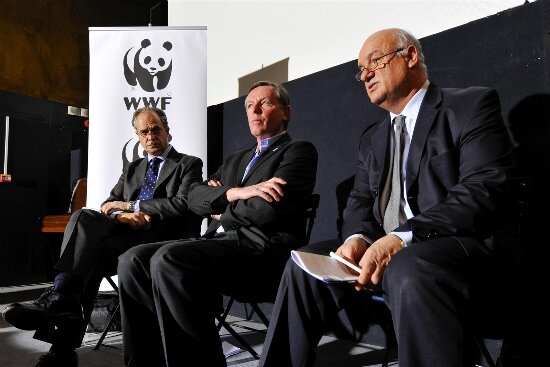
Charles Clover, Tony Long of WWF and Joe Borg, Commissioner for Maritime Affairs and Fisheries, debate Europe’s fisheries policy after a WWF screening of The End of the Line
The screening had been organised by WWF for members of the European Commission and country representatives ahead of the publication of the Green Paper on the reform of Europe’s fisheries policy last week.
I was surprised and impressed by two things. First, the openness and dedication with which Commissioner Borg trotted along and watched an 82-minute film and debated its conclusions, especially since these are even more damning about Europe’s management of its fish stocks than the Commission’s own Green Paper – which admits that 90 per cent of Europe’s fish stocks are overfished.
Continue reading ‘Nice reforms Mr Borg, but aren’t you missing something?’

Europe’s fishing policy has failed and nearly nine tenths of its fish stocks are overfished, the European Commission has admitted.
The Commission published a Green Paper proposing radical reforms of the Common Fisheries Policy (CFP) and began an open debate on the proposed measures which will last until the end of this year.
Among the proposals are:
- A ban on the “discarding” of under-sized and unmarketable fish at sea.
- Making the ecological sustainability of fish stocks the paramount objective of European policy, on which economic viability depends, rather than a factor to be weighed off against the survival of the fishing industry, as it is at present.
- Devolving decisions on the management of fisheries closer to the people they affect.
Continue reading ‘EU admits nine tenths of fish stocks are overfished’

With concern over bluefin tuna stocks growing among environmental groups, we round up the latest news at the start of the Mediterranean bluefin tuna fishing season.
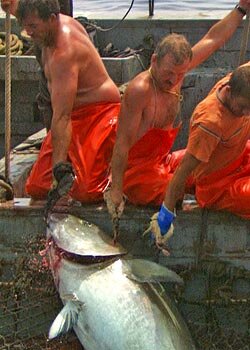
A large tuna is caught by fishermen
Reuters report that a new WWF report says overfishing is set to wipe out bluefin tuna in three years.
The news agency says: “Overfishing will wipe out the breeding population of Atlantic bluefin tuna, one of the ocean’s largest and fastest predators, in three years unless catches are dramatically reduced, conservation group WWF said.
“As European fishing fleets prepare to begin the two-month Mediterranean fishing season, WWF said its analysis showed the bluefin tuna that spawn - those aged four years and older - will have disappeared by 2012 at current rates.”
Sergi Tudela, head of fisheries at WWF Mediterranean, said: “For years people have been asking when the collapse of this fishery will happen, and now we have the answer.” Continue reading ‘Bluefin tuna fishing season starts in the Mediterranean’

Most deep sea fisheries are unsustainable and should be closed, a new report says.
The call comes after a 25-year-long marine study revealed that commercial fishing in the north-east Atlantic could be damaging species at much greater depths than previously believed.
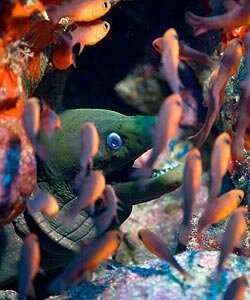
Moray eel - the study found numbers of one species of eel were down by half
Numbers of deep-water species living a kilometre below the reach of trawlers are apparently being affected by fishing practices, the new study found.
Although scientists have known that commercial fishing does affect deep-water fish populations they have now discovered it is occuring at much greater depths.
Populations of north-east Atlantic commercial deep-water fish such as black scabbardfish, orange roughy and roundnose grenadier have dwindled since deep-water fishing started in the area in the late 1980s but a quota system wasn’t introduced until 2003.
Dr David Bailey of the University of Glasgow, who led the study, published in the journal Proceedings of the Royal Society B, said:
“Commercial fishing may have wider effects than anyone previously thought, affecting fish which we assumed were safely beyond the range of fishing boats. We were extremely surprised by this result and believe that it has important implications for how we manage the oceans.”
Deep-water fish living off the west coast of Ireland were monitored by Natural Environment Research Council-owned ships from 1977 until 1989 before any fishery was operating in the region.
Researchers checked the same area again from 1997 until 2002 using exactly the same methods and the results were then compared as part of an EU-led project to study deep-sea species. Continue reading ‘Deep sea fish suffer far greater damage than was first thought’

Fish must be exploited less heavily if they are to adapt to climate change, according to the UN Food and Agriculture Organisation.
Responsible fishing practices need to be more widely adopted to tackle over-fishing and fishery management plans should include strategies for coping with rising sea temperatures.
“Best practices that are already on the books but not always implemented offer clear, established tools towards making fisheries more resilient to climate change,” said Kevern Cochrane, one of the authors of The State of World Fisheries and Aquaculture (Sofia), 2009.
“So the message to fishers and fisheries authorities is clear: get in line with current best practices, like those contained in FAO’s Code of Conduct for Responsible Fisheries, and you’ve already taken important strides towards mitigating the effects of climate change.”
Climate change is already altering the distribution of both marine and freshwater species with warmer-water species being pushed towards the poles and experiencing changes in habitat size and productivity, the report says.
It is also affecting the seasonality of biological processes and altering marine and freshwater food sources which has unpredictable consequences for fish production.
A decrease or loss of locally available fish stocks will pose serious problems for communities which depend on abundant supplies for their livelihood.
“Many fisheries are being exploited at the top range of their productive capacity. When you look at the impacts that climate change might have on ocean ecosystems, that raises concerns as to how they’ll hold up,” said Cochrane.
Vulnerable communities who rely on their fishing and aquaculture industries need to take urgent action to strengthen their resilience to climate change, the report urges.
The authors of the report say that fisheries and aquaculture make a minor but significant contribution to greenhouse gas emissions during fishing operations and the transport, processing and storage of fish.
The average ratio of fuel to carbon dioxide (CO2) emissions for capture fisheries is estimated at about 3 teragrams of CO2 per 1m tonnes of fuel used.
“That could be improved. Good fisheries management can substantially improve fuel efficiency for the sector,” Cochrane said.
“Overcapacity and excess fishing capacity mean fewer fish caught per vessel - that is, lower fuel efficiency - while competition for limited resources means fishers are always looking to increase engine power, which also lowers efficiency.”
Much of the industry’s carbon footprint comes in the transport of the fish, particularly by air, once they have been harvested.
Intercontinental airfreight emits 8.5 kg of CO2 per kilogram of fish transported. This is about 3.5 times that for sea freight and more than 90 times that from local transportation of fish where it is consumed within 400 kilometres of catch.

![]()








